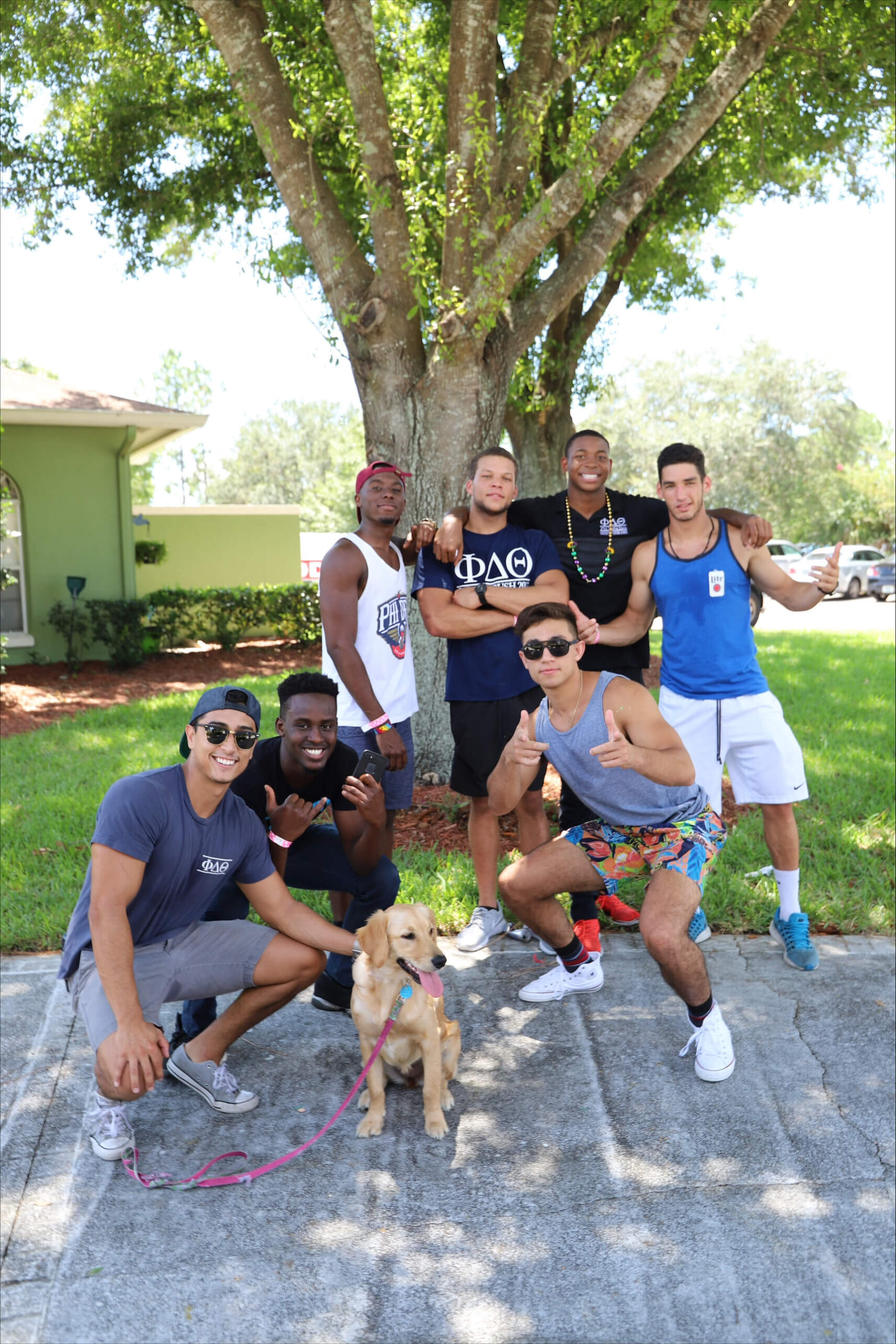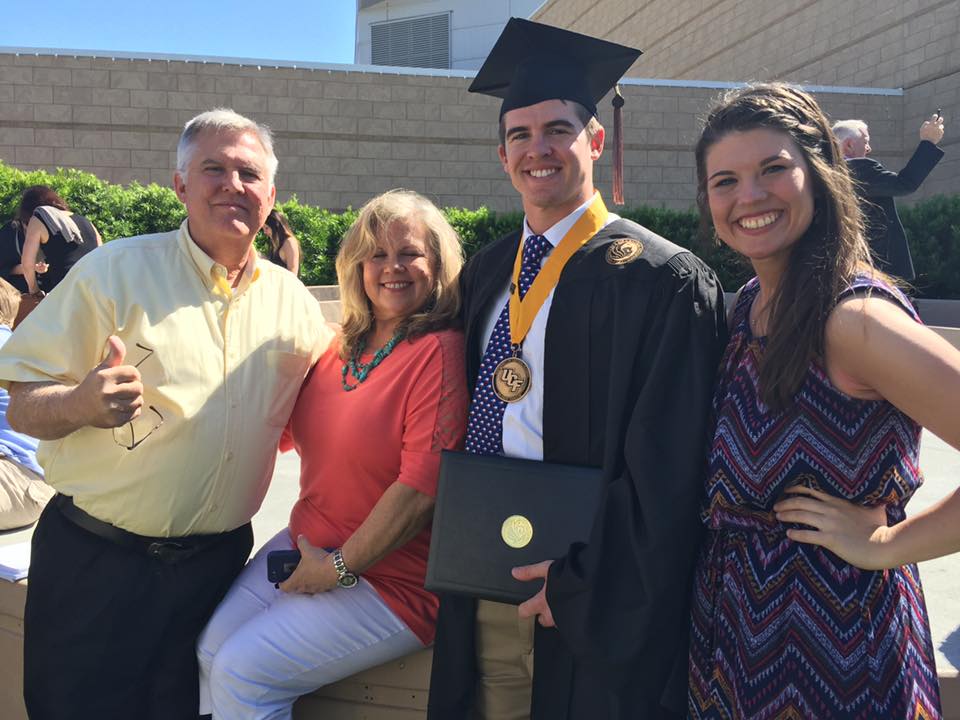Nicholson Alumnus Kevin Contento ’11 Racking Up Movie Honors

By Camille Dolan ’98
1 EXT COVERED PATIO, PALM TREES SWAYING IN THE BACKGROUND
We encounter a young man, 30ish, reclining in a comfortable chair as he gazes at his laptop. He is replying to a voice offscreen. The young man, Kevin Contento ’11 is discussing his journey to UCF and his success as a filmmaker since graduating.
“UCF was always in the back of my mind for college,” Contento says. After applying to all the state schools mainly because of his Bright Futures scholarship, he says UCF “just ended up being the best bet.”
Growing up in South Florida, Contento became interested in making movies. It was a career choice that, frankly, baffled his parents. His father was born in Colombia, and his mother was born in the United States, but her parents came from Colombia.
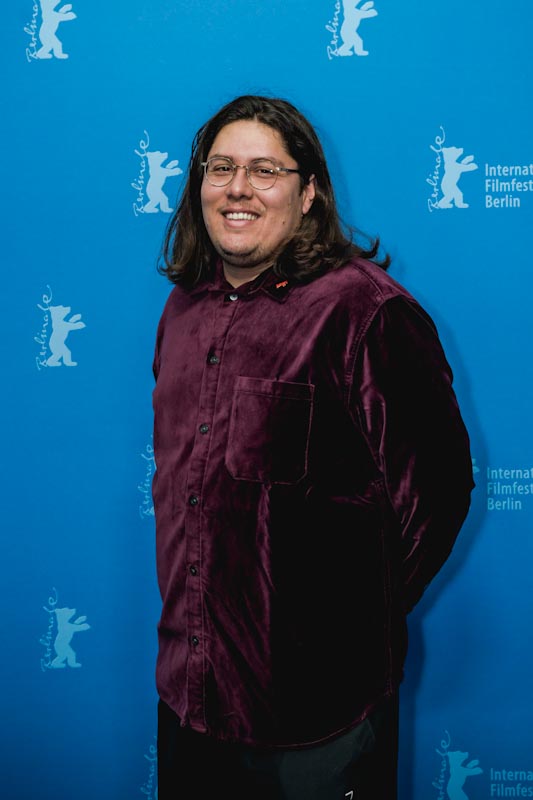
Above, Kevin Contento at the Berlin International Film Festival
Contento’s parents worked very hard to provide for their family, often putting aside their own dreams to focus on the dreams of their children.
“I always felt like my mother would take certain jobs in her life not necessarily because it was her passion, but because it was a steady, reliable job,” Contento says.
It was difficult for Contento to explain to his parents that he wanted to do something creative that fulfilled him. He was not only a first-generation college student, but he was also the first to finish graduate school, and definitely the first to pursue a very different career choice.
His mother, ironically, was perhaps instrumental in leading Contento’s creative journey. She encouraged him to notice the different cloud formations that billowed in South Florida, and to observe the way that people behaved and interacted with each other.
“I grew up with a lot of characters,” Contento says of his near and extended family. There were a lot of “archetypal people” from whom Contento was unknowingly casting for his future movies.
Plus, the landscape in South Florida is so much different than anywhere else, Contento says. Not far away from Miami and Boca Raton are the massive sugar cane fields of the Everglades, comprising four small towns of mostly Black, low-income individuals. (Below, Kevin Contento, second from right) and his crew from his feature film, Hierophany)
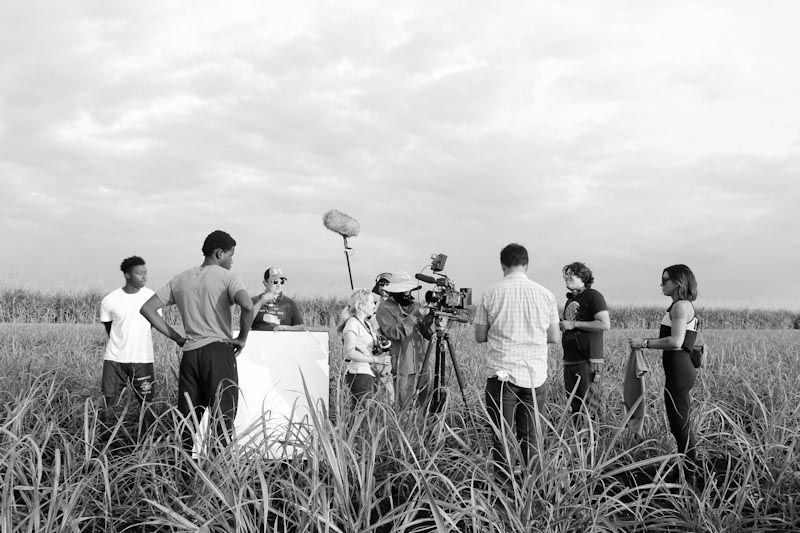
“If you go through the Everglades and take US 27 North, you’ll come up on these small towns at the tip of Lake Okeechobee,” Contento says. “You realize that these towns are incredibly different, and it doesn’t even look like Florida anymore. But of course, it is.”
Every year for six to eight months straight, the sugar plantations that ring Lake Okeechobee burn hundreds of thousands of acres of sugar cane in an archaic and toxic, yet state-approved method of pre-harvesting the fields to make it easier for the factories to process the sugar.
The fires also have the tendency to drive out the wild rabbits that live in the fields, leading to a lucrative side hustle for not just local children, who chase the rabbits for sustenance or for extra money, but for men and women of all ages, Contento says. “I recently met a rabbit hunter who is in his 70s.”
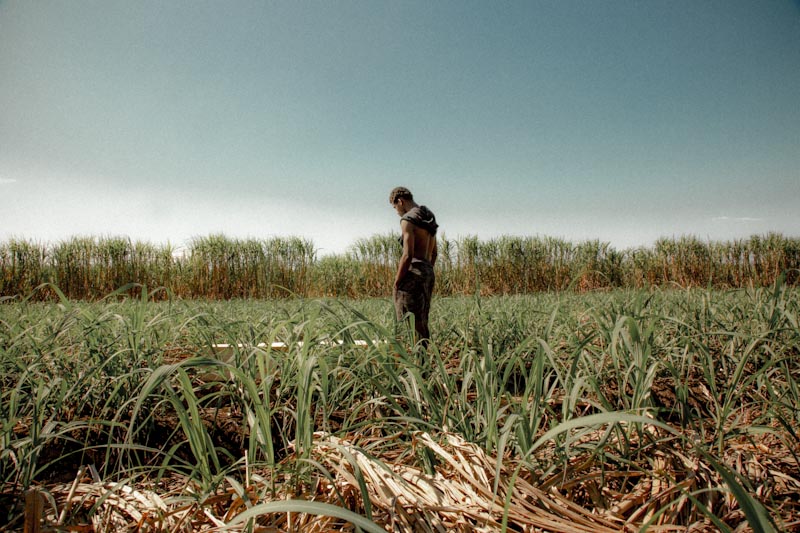
Above, Jean Voltaire, an actor in many of Kevin Contento’s films, surveys the Florida sugar cane fields.
At the end of his time at UCF and before graduate school, he had known of the unique lives and livelihoods of the residents in the area. He had also met Jean Voltaire, a Pahokee resident of Haitian descent, as he was finishing up his master’s thesis.
The two became close friends, and Voltaire has appeared in several of Contento’s films, including Hierophany, his directorial debut and master’s thesis film, a fantastical tale of rabbit hunting in Pahokee, and in his most recent film, From Fish to Moon, which allows viewers to glimpse the dynamics of a Pahokee convenience store.
The latter has received multiple international honors, including selection in the 2023 73rd Berlin International Film Festival/Berlinale Shorts Competition Selection, the 2023 40th Miami International Film Festival Selection, and the 2022 New Orleans Film Festival Selection. (Below, the movie poster for “From Fish to Moon”)
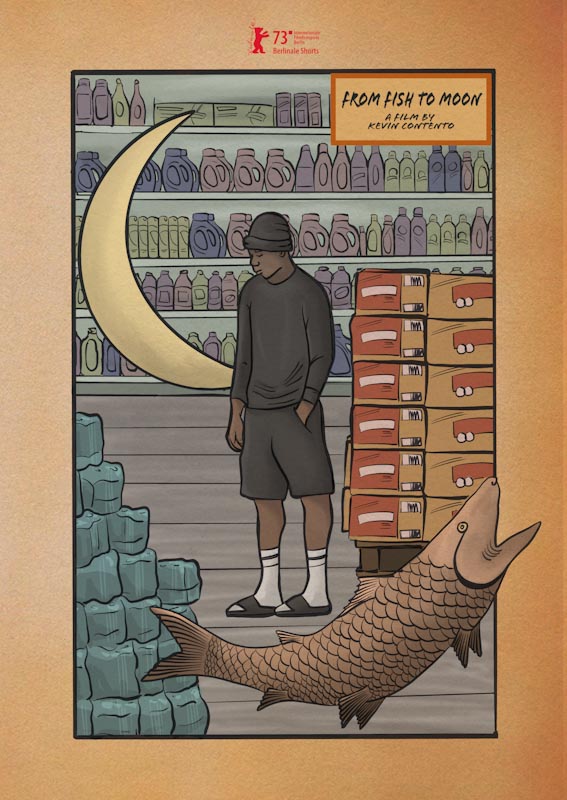
Contento had been to the convenience store many times over the years, and its combination of slot machines, in-store butchery, and boiled peanuts, plus the clientele served as creative fodder for him.
But it was his connection to Voltaire that inspired him to make the film; Voltaire had started working there in real life, and Contento asked the ownerif he could use the location for his film. His longtime friendship with Voltaire, plus his background as he grew up in the area gave him credibility, building instant trust.
“I was just grateful to be there,” Contento says. “My whole purpose was, just don’t get in their way. Let them do what they do naturally.” (Below, a screenshot from “From Fish to Moon”)
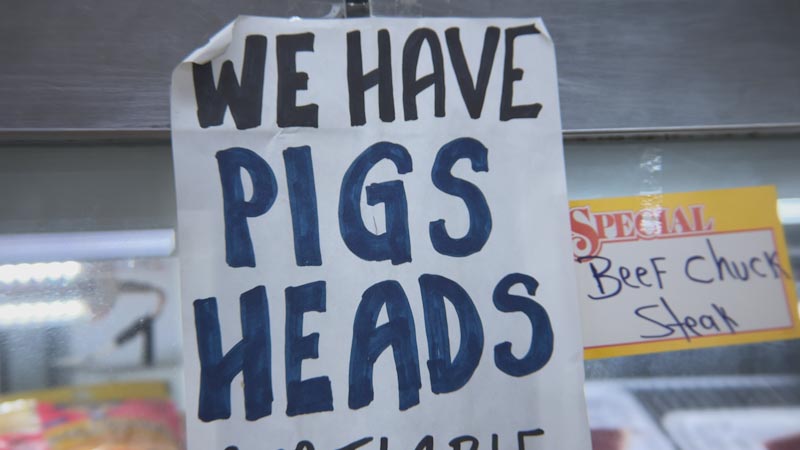
Contento was not an overnight success, he says. From the time he noticed his grandfather’s huge camcorders as a young boy, he was probably hooked on the movie-making process.
Then, as technology improved and became more affordable, he discovered editing software that was available on his family’s home computer.
“That was revolutionary in the sense that I could download a video, and suddenly I had a timeline where I had my audio track and my video track, and I could bring in my own music and put it over the video and change the entire thing,” Contento says.
After UCF, Contento moved back to South Florida as a freelancer, and did a lot of production assistant work on TV shows, independent projects and even some bigger budget films. But what he was missing, he says, was the opportunity to create his own projects.
Since 2013, a lot of that has changed, he says. Now, many cities have artist collective organizations that are “very supportive of young voices and young creators. But back then, it was like, you either know somebody, or you have friends that want to help you make things. And that’s what I wanted to do back then.”
When he went to Columbia University in NYC for his master’s degree in cinema studies, the prevailing wisdom at the time was that in order to “make it” as a film maker, one had to live in NYC or in LA. He did both.
“I didn’t really much enjoy it,” Contento says. “I really like to tell Florida stories, and so it became a thing to stay around here. And then the pandemic hit.”
The pandemic gave Contento a chance to buckle down and finish the editing and post-production work on his debut feature film, “The Conference of the Birds, which premiered in 2021.
“I won’t say that I’m anywhere really, really good at it,” Contento says, “But I have become attuned to listening to what people have to say. I am always listening.”
When Contento finishes a film, the process for getting it out into the world can be lengthy. He researches various film festivals around the world to determine which would be suitable. He is always conscious of Florida’s film festivals because “they are really supportive of Florida storytellers and filmmakers.”
And then, he branches out and may apply to other, bigger festivals; being accepted can be a miracle, he says, because sometimes he is competing against thousands of other submissions, and “sometimes, they don’t even look at everything.”
If Contento’s film is accepted, that’s great, he says, but then he has to create marketing materials for the film, and technical deliverables that allow the festival to project the film, processes that add additional expenses to his bottom line. Generally, he says, any nominal award that a filmmaker might win will never make up for the money that has already been invested.
Yet, Contento keeps doing it.
“You know, you have such a good time, and you make another film, a short or a feature,” Contento says. “And that is just the life of a filmmaker,” he laughs.
Contento’s film, Hierophany, tells another story from South Florida like rabbit hunting merged with fantastical elements including falconry. It was also his project for his master’s thesis.
He had become interested in falconry way before grad school in South Florida’s sugar cane fields. He had volunteered at a wildlife refuge where he noticed the artistry between a bird and a falconer. It was a “genesis moment” for Contento’s master thesis year’s later.
It’s not that easy to hire a falconer. Contento worked for months to secure a talented and trained animal handler.
“I remember being there with him, and watching him fly the bird,” Contento says. That was the beautiful, artistic part, he says. The business side of filming came into play when his insurance company made him break down every aspect in which the bird had screen time.
“’So if you’re telling me you have a bird, who’s the bird handler?’” Contento recalls. The bird had multiple organizations involved in its welfare.
As Contento looks back on his time since UCF, he says his journey would never have been possible without the relationships he’s made along the way, and the realization that everything that he has filmed or wants to film has its genesis in his Florida roots.
“My relationships are everything to me,” Contento says. “When I think of making a film, I’m not thinking of the actual ‘work’ of filming, rather, I am thinking of meeting someone who hopefully is going to be my best friend, or someone I will be able to keep in contact with for the rest of my life. And as a storyteller, I think that if I can bring in my community into my films, that I will always find the thing that I am looking for.”
Contento is still writing – literally – what will likely be his most meaningful story. He has a ten-month-old daughter, and becoming a father has inspired him to create his next movie, a documentary on three fathers in Pahokee. Some of the fathers are empty nesters with grown children, and others are young fathers just learning how to parent. There are many aspects of fatherhood and family in general to consider, he says.
“One of the things I learned at UCF was that we all have our own story to tell, and that we don’t always get a chance to do it. Don’t let your ideas just float away. Find your story and keep charging on.”
END
